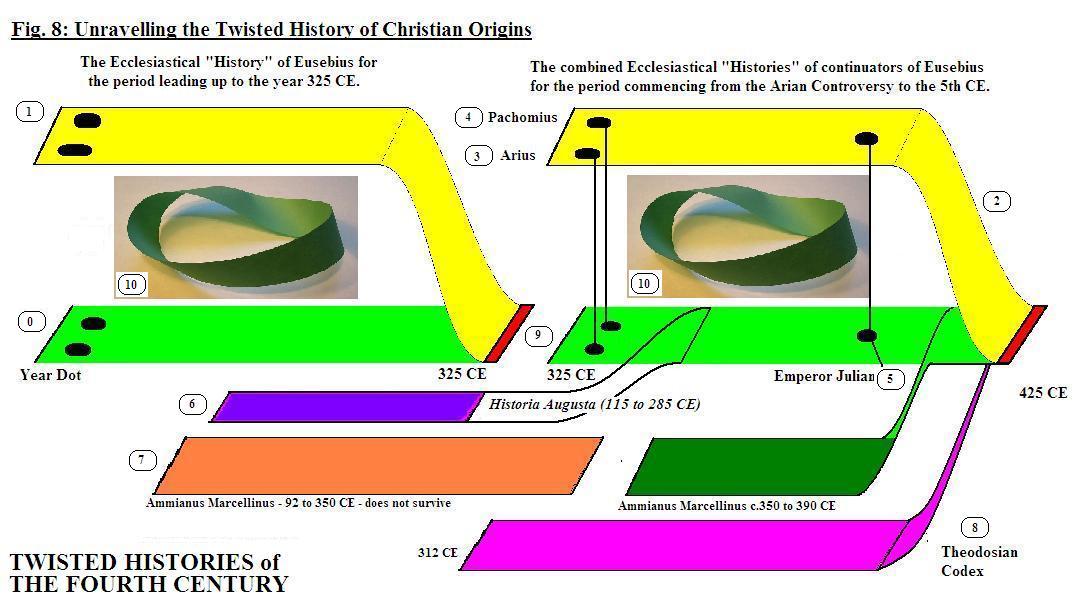
 |
Freethought & Rationalism ArchiveThe archives are read only. |
|
|
#61 | |||||
|
Contributor
Join Date: Mar 2006
Location: Falls Creek, Oz.
Posts: 11,192
|
Quote:
This is an extremely valid point that needs to be stressed. In the 9th century (and after) when the Pseudo-Isidore forgery was being undertaken, those involved were associated with the church which, at that time, was subject to the state. The purpose of these forgeries was to bolster papal and bishop authority. The material forged included material from the pre-Nicaean epoch and material from the era of Damasus (late 4th CE) for a number of centuries. The form of the forgery was to gather "old sentences" and cobble them together into new works which supported the agenda of the forgery mill. However in the 4th century, if we are to consider a forgery mill to have been commissioned and "fired up" then this agenda had imperial support and with it the support of the Roman Army. Evidence suggests that the army was deployed to perform search and destroy operations for "prohibited books". The owners who preserved these books in their bookcase were to be immediately beheaded. Throughout the 4th and 5th centuries the Christians burned books. They had imperial support (except for a brief respite under Julian). Not only did the Christian regime burn knowledge, they destroyed the Greek architecture - tearing down the pagan temples to their foundations and rebuilding Christian basilicas. So therefore the 9th century forgery mill that is now known as "Pseudo-Isidore" has a completely different political context than the proposed 4th century forgery mill under the imperial sponsorship of the emperor Constantine. One report of the council of Nicaea states that Constantine even burnt material during the council - petitions that he had earlier requested from the attendees were burnt in their presence. Quote:
As one moves back from the 21st century to the forgery mill of Pseudo-Isidore the context becomes more and more barbaric. By the 4th century the depravity of war, power struggles and racketeering become far more intense. And then we sometime arrive at the obvious parallel between "Pseudo-Isidore" and "Eusebius", the very first person who thought that the emerging Christian church needed a history written for it. He is first to embark on writing "Real History" about Jesus and the Apostles and the Apostolic Church and only about 300 years after the events had supposedly transpired. Some Comments on "Pseudo-Isidore" "Eusebius" εὐδαιμονία | eudaimonia |
|||||
|
|
|
|
#62 | |
|
Contributor
Join Date: Mar 2006
Location: Falls Creek, Oz.
Posts: 11,192
|
Quote:
The Green in the following diagram is the (pagan) Greek Intellectual tradition. The thesis of Charles Freeman suggests the Greek Intellectual tradition was suppressed by the Christian culture and "history" (Yellow, and it is proposed mainly pseudo-historical). It took more than a thousand years to resurface.  The process is a little like the splicing of a (history) tape and is mimicked and bolstered in part by the 9th century CE Pseudo-Isidore forgery of even more pre-Nicaean documents. εὐδαιμονία | eudaimonia |
|
|
|
|
|
#63 | |||
|
Contributor
Join Date: Mar 2006
Location: Falls Creek, Oz.
Posts: 11,192
|
Considering this .....
http://pseudoisidore.blogspot.com.au/ Quote:
What sort of trust are we to invest in any manuscripts sourced from the Corbie Library during the time of Paschasius Radbertus? The 'Corbie' Collection Quote:
MSS of Tertullian at Corbie Quote:
|
|||
|
|
|
|
#64 | ||
|
Contributor
Join Date: Mar 2006
Location: Falls Creek, Oz.
Posts: 11,192
|
Quote:
QUOTE MINING of the LXX and early Platonists in the NT Forgery Mill The modus operandi of 9th century Pseudo-Isidore forgery mill was shown to be associated with taking hundreds and hundreds of phrases from older writings (so as to appear old) and then recombining them PLUS adding a few more, or twisting the phrases about, etc. This has already been discussed above. At the atomic level of both the Pseudo-Isidore and the 4th (5th/6th/7th/8th/9th ???) Pseudo-Eusebian forgery mills a process may be hypothecised whereby the appropriation of phrases, which are then recombined with other sets of phrases, creates the (false) impression of a 1st and 2nd and 3rd century Platonist-Christian literary source. There may have been at least major sources for the new testament and early church father documents. The first was the Greek LXX and the second was the entant literature of 1st, 2nd and 3rd century pagan philosophers and particularly the Platonists. The method at the atomic level of the cut and paste forgery were identifying phrases that would be appropriated and then stitched together in various ways. I hope I do not need to argue the case how the Greek New testament may be seen to be largely a cut and paste exercise from the Greek LXX. The forgery of the Church Fathers in part also relied on identifying phrases that would be appropriated from Platonist writers of the early centuries, and then stitched together in various ways with the addition of both New Testament and LXX copy paste thereby creating some of the early church fathers, such as for example, Philo and Clement. For a discussion of Clement and Plato have a look at: Clement of Alexandria and the Beginnings of Christian Platonism For the appropriation of Platonic terms and phrases about the soul that was about to be "saved" have a look through Plotinus on the Seat of the Soul: Reverberations of Galen and Alexander in "Enn." IV, 3 [27], 23 For a healthy suspicion that Platonist/Pythagorean sources may have been manipulated, Also see Atticizing Moses? Numenius, the Fathers and the Jews Author(s): M. J. Edwards Source: Vigiliae Christianae, Vol. 44, No. 1 (Mar., 1990), pp. 64-75 Published by: BRILL. Quote:
These articles may assist to test out and discuss the hypothesis. |
||
|
|
| Thread Tools | Search this Thread |
|